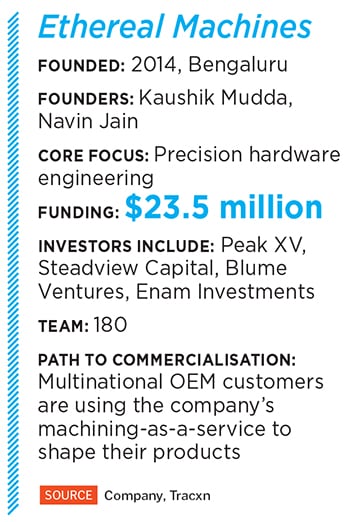Ethereal Machines: Creating machining-as-a-service for the world
A problem became an opportunity, and an award-winning CNC machine is at the heart of a manufacturing service that the startup is pioneering from India


Kaushik Mudda and Navin Jain, co-founders of Ethereal Machines, were still in college when they stumbled upon the limitations of a robotic arm they’d built it led them to the world of computer numerical control (CNC) machining. Long story short, they decided the best way forward was to make their own machines. And when they made the first one, “we realised a problem we were trying to solve for ourselves was also a massive opportunity", Mudda recalls.
Ethereal was started in 2014. As with most such learning journeys, there were at least two more leaps the young entrepreneurs took—or rather one jump and one pivot.
The jump was for the first three or four years, after starting with the simpler three-axis machine, they realised that modern manufacturing required more complex machining as components became more intricate. So, Mudda and Jain made the leap to building their own five-axis machines, which won them an international industry award as well.
 However, from their first prototype in 2018, and seed funding of $1 million from Blume Ventures, it took the duo four years to nail down a market-ready machine. That was the second leap. Yet, no one believed a couple of youngsters from India could have built a machine like this. And, over the next four years, even as they continued to incrementally improve their machines and sold a few, including in Japan, customers would often say disheartening things like “we’ll use your machine for a year, and they we’ll pay you".
However, from their first prototype in 2018, and seed funding of $1 million from Blume Ventures, it took the duo four years to nail down a market-ready machine. That was the second leap. Yet, no one believed a couple of youngsters from India could have built a machine like this. And, over the next four years, even as they continued to incrementally improve their machines and sold a few, including in Japan, customers would often say disheartening things like “we’ll use your machine for a year, and they we’ll pay you".
The pivot, then, was that they realised that it made more business sense to use their machines to make components for customers around the world, rather than try to sell the machines to them. And so they arrived at their current business model: “Machining as a service", as Mudda described it. “In the last 12 months, our revenues have grown 5x, so now we don’t sell our machines," he says.
Ethereal’s team has grown to about 180 people. And today the company operates 21 machines. By the end of the current fiscal, they expect to have 75 to 100, and hit between 750 and 1,000 machines in five years.
Aerospace and defence, health care, and consumer electronics are large verticals where Ethereal can tap customers. The company has opened a 50,000 sq ft state-of-the-art facility recently, and “we are servicing marquee customers in the US, Israel, Germany and India, from Bengaluru", he says.
Peak XV and Steadview Capital have stepped in to lead a $13 million Series A investment in the company. That money will help the company build a factory 5x bigger.
First Published: Jul 08, 2024, 12:25
Subscribe Now